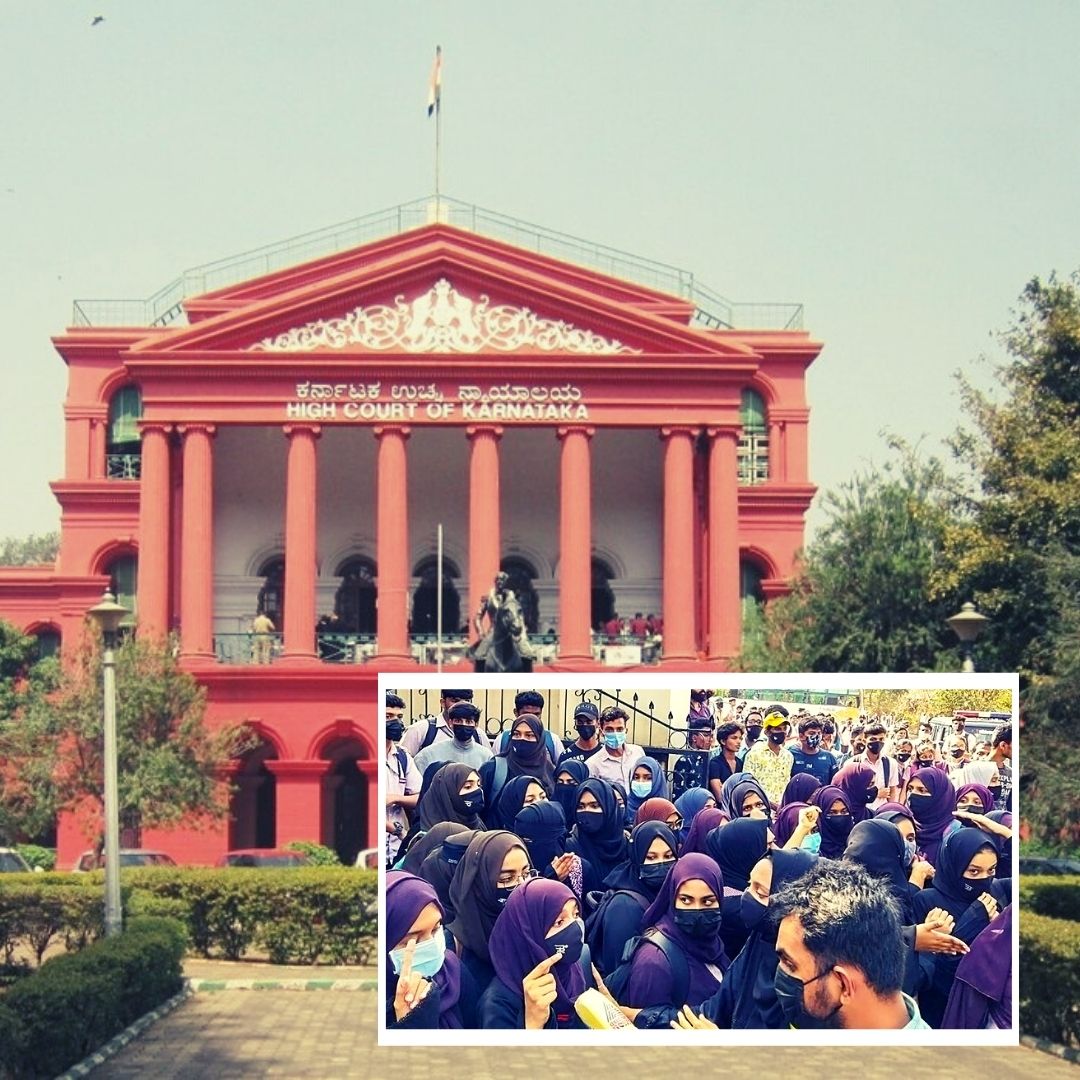
Image Credits: Wikipedia, The Indian Express
Hijab Row: Karnataka HC Dismisses All Petitions, Says 'Wearing Hijab Non-Essential Part Of Islam'
Writer: Tashafi Nazir
For most people, journalism sounds hectic and chaotic. For her, it's a passion she has been chasing for years. With an extensive media background, Tashafi believes in putting efforts on presenting a simple incident in the most interesting way.
Karnataka, 15 March 2022 6:45 AM GMT
Editor : Snehadri Sarkar |
While he is a massive sports fanatic, his interest also lies in mainstream news and nitpicking trending and less talked about everyday issues.
Creatives : Tashafi Nazir
For most people, journalism sounds hectic and chaotic. For her, it's a passion she has been chasing for years. With an extensive media background, Tashafi believes in putting efforts on presenting a simple incident in the most interesting way.
In February, the Karnataka HC had temporarily banned religious attires, including Hijab and saffron scarves, as the controversy snowballed into protests and a face-off between different groups of students.
In a massive setback to students who had challenged a ban on wearing the hijab in class, the Karnataka High Court today, on March 15, in its verdict, said that 'hijab' is not an essential religious practice. Five petitions had challenged the ban in court.
Ahead of the order, the state government banned large gatherings for a week in Bengaluru "to maintain public peace and order". Large gatherings were banned in Mangalore as well from March 15 to 19. Educational institutions are closed in Udupi today.
On February 25, the full bench of Chief Justice Ritu Raj Awasthi, Justices Krishna S Dixit and Jaibunnisa Mohideen Khazi had reserved judgment on a batch of petitions filed by Muslim girls from government pre-university colleges in the Udupi district.
The Karnataka High Court had temporarily banned religious attires in February, including Hijab and saffron scarves, as the controversy snowballed into protests and a face-off between different groups of students, NDTV reported.
'A Welcome Move'
Responding to the verdict, Karnataka education minister BC Nagesh said, "The uniform is there just to ensure all students feel equal, so no inferiority or superiority complex arises among the young minds of the country."
Welcoming the court's decision, Union Minister Pralhad Joshi said, "I appeal to everyone that the state and country have to go forward, everyone has to maintain peace by accepting the order of the high court. The basic work of students is to study. So leaving all this aside they should study and be united."
Post 1947 India can not tolerate League mentality . Karnataka High Court' s verdict on #Hijab I endorsed it .
— Prof Rakesh Sinha MP (@RakeshSinha01) March 15, 2022
Hijab is not an essential practice of Islam and can't be allowed in schools and colleges, rules Karnataka High Court. I welcome the judgment as it upholds the sanctity of uniforms and brings the focus in schools and colleges back on education.#HijabControversy #Hijab #Karnataka pic.twitter.com/ZGVhVSV6jT
— Dr Sudhakar K (@mla_sudhakar) March 15, 2022
Muslim Leaders Express Displeasure
Reacting to the Karnataka High Court hijab judgement, many Muslim community leaders expressed displeasure and vowed to move the Supreme Court.
Akhtarul Wasey, President Maulana Azad National Urdu University, Jodhpur and former professor of Islamic Studies at Jamia Millia Islamia University told Asianet Newsable, "We are not satisfied with the decision the Karnataka High Court has delivered now. Whatever is said in the Quran, (HC) cannot make it null and void. That's a divine word and we are bound to follow that."
Maqsood Imran Rashadi, Bengaluru's Jamia Masjid Imam said, "All should respect the Court order. If the community is not happy with the decision, they can approach the Supreme Court. I appeal to the girls preferring hijab not to get dejected. Appeal them to follow their Sharia law. There are cases where the courts have given stay at midnight."
Very disappointed by the verdict of the Karnataka High Court. Regardless of what you may think about the hijab it's not about an item of clothing, it's about the right of a woman to choose how she wants to dress. That the court didn't uphold this basic right is a travesty.
— Omar Abdullah (@OmarAbdullah) March 15, 2022
How It All Started?
The hijab row came to the limelight on January 1 at Government PU College in Karnataka's Udupi, where six female students alleged that they were not allowed to enter classrooms wearing religious scarf. The students held a press conference, where they claimed that they sought permission, but the college administration refused to let them enter the premises with their faces covered.
They protested against college authorities, which soon snowballed into a statewide issue. Reportedly, similar protests emerged from other parts of the state. These protests and counter-demonstrations involving saffron scarves have since spread to other parts of the country.
Several videos of the protests went viral, which showed students of two different communities engaging in verbal spats. One such video emerged from a college in Mandya, which showed a Muslim girl standing her ground as many saffron scarf-wearing boys heckled her and shouted "Jai Shri Ram" slogans. She called back at them: "Allah hu Akbar!"
Meanwhile, more than 10,000 policemen will be deployed across the city and an additional reserve police force and city armed reserve force will also be on duty. Further, the DCPs have been directed to keep a tab on social media.
 All section
All section














